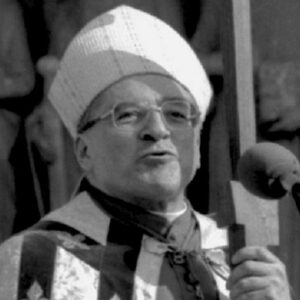Aaron Jean-Marie Lustiger was the Archbishop of Paris during his time as a cardinal in France. Lustiger’s background is particularly unusual in that he was born to Polish Jews, converted to Roman Catholicism as a child, and rose through the ranks of the Roman Catholic Church in Paris. He led France’s 45 million Catholics for over two decades as Archbishop, an unusual success for someone who was born into another faith. He was an early proponent of interfaith dialogue, which is unsurprising. He saw Christianity as Judaism’s crowning achievement, and Jewish-Christian relations were a constant theme in his talks. Despite his conversion to Catholicism, he maintained his Jewish faith and considered himself a Jewish Christian, just like the early disciples. He was a staunch anti-abortion conservative who fought to keep the clerical vow of celibacy intact. He was also educated and forthright, with a captivating demeanor that made him a popular church leader. He was a close adviser to Pope John Paul II and was even mentioned as a potential successor. He worked to bring Catholics and Jews together, and as a result, he became popular among people of both faiths.
Childhood and Adolescence
Aaron Lustiger was born in Paris on September 17, 1926. His parents, Charles and Gisele Lustiger, were Polish Jews who immigrated to France during WWI. His father used to own and operate a hosiery store.
He attended the Lycée Montaigne in Paris for his elementary schooling.
In 1940, when Germany invaded France, Aaron’s parents moved him and his sister to live with a Catholic widow in Orleans. He decided to convert after being exposed to Christianity. His father was outraged by his son’s decision, despite the fact that his parents were not practicing Jews.
Aaron completed his conversion and was christened by Bishop Jules Marie Courcoux of Orleans in August 1940, giving him the name Jean-Marie.
In 1942, his mother, who had been sent to Auschwitz, died. Aaron, his father, and his sister managed to flee with tremendous difficulty.
After the war, he proceeded to the Sorbonne and then to the Catholic Institute of Paris, a clergy training school. In 1954, he was ordained.
Career of Aaron
In 1954, he was appointed as a chaplain at the Sorbonne, where he remained until 1959. He was then appointed director of the Richelieu Center, which trained chaplains for French universities, a position he held for eleven years.
In 1969, he was appointed parish priest of Ste. Jeanne de Chantal in Paris’s 16th district. When Lustiger joined the parish, it was in one of the city’s richer areas, and the congregation was fairly complacent. With his efforts, he was able to develop the Parish into a very dynamic one.
Pope John Paul II appointed him Bishop of Orleans in 1979. Given his Jewish ancestry, he was taken aback by this appointment, as he had not expected to be given such a high post in the French Roman Catholic Church.
He was named Archbishop of Paris in 1981, succeeding Cardinal Marty. The founder of the Traditionalist Catholic organisation, Society of St. Pius X, protested Lustiger’s appointment, claiming that he was not of true French ancestry.
In the summer of 1982, he attended the annual congress of the Comunione e Liberazione movement in Rimini, and the following year, Pope John Paul II named him Cardinal-Priest of Santi Marcellino e Pietro.
In Paris, he built several new churches and instituted changes in the Archdiocese of Paris. In 1984, he assisted in the establishment of an independent theology faculty at the École cathédrale de Paris.
In 1994, he was appointed Cardinal-Priest of San Luigi dei Francesi. After becoming a cardinal, Lustiger’s popularity skyrocketed. He became well-known around the world and was even considered for the position of Pope, and he was sometimes referred to as a Jewish Pope.
He was interested in politics as well as religion, and he kept tight ties to the political sphere. Despite their political differences, he had strong connections with François Mitterrand’s Socialist government. He even presided over Mitterrand’s funeral as Archbishop of Paris.
He arranged a World Youth Day in 1997, which took place in Paris. This was in response to those who said that European youth were uninterested in religion. More than a million individuals attended the event, demonstrating that young people are open to religion.
In September 2001, at the age of 75, he offered his resignation as Archbishop of Paris to Pope John Paul II. After a few years of reluctance, the Pope ultimately accepted his retirement in 2005.
Achievements & Awards
In 1998, the Center for Christian-Jewish Understanding gave him the Nostra Aetate Award for improving Catholic-Jewish ties.
He received the Sovereign Order of Malta’s Bailli Grand-croix d’honneur et de dévotion and the Order of the Infant Henry the Navigator’s Grand-Cross.
Personal History and Legacy
He was a cheerful, good-natured man who was well-liked by many. He was a vocal opponent of racism and was regarded for being a vivacious and passionate individual.
He died on August 5, 2007, after being diagnosed with bone and lung cancer. After his passing, the World Jewish Congress paid him tribute.
Jean-Marie Lustiger Net Worth
Jean-Marie Lustiger’s main source of income is as a successful actor. He is a Frenchman. Jean-Marie Lustiger’s net worth is believed to be $1 Million – $5 Million dollors.


